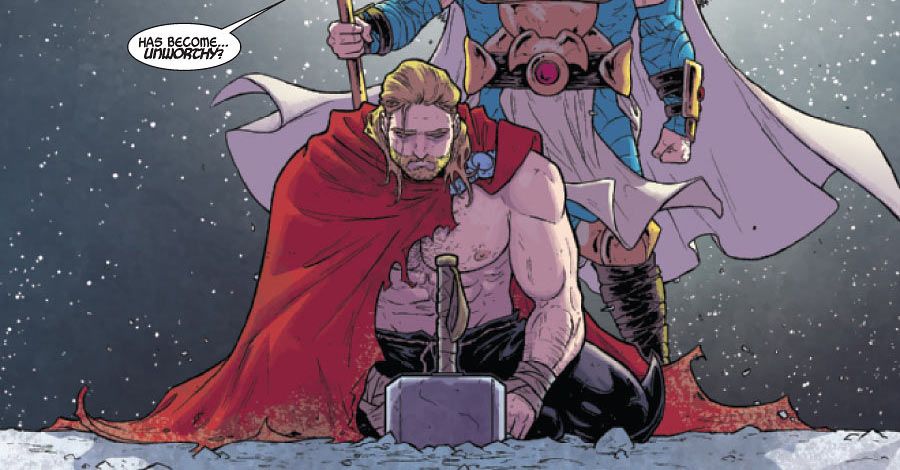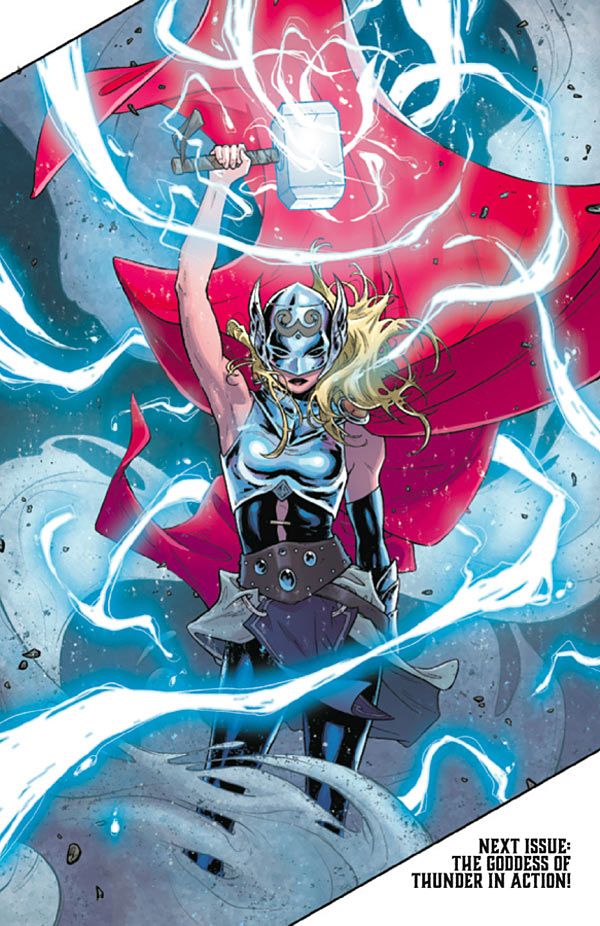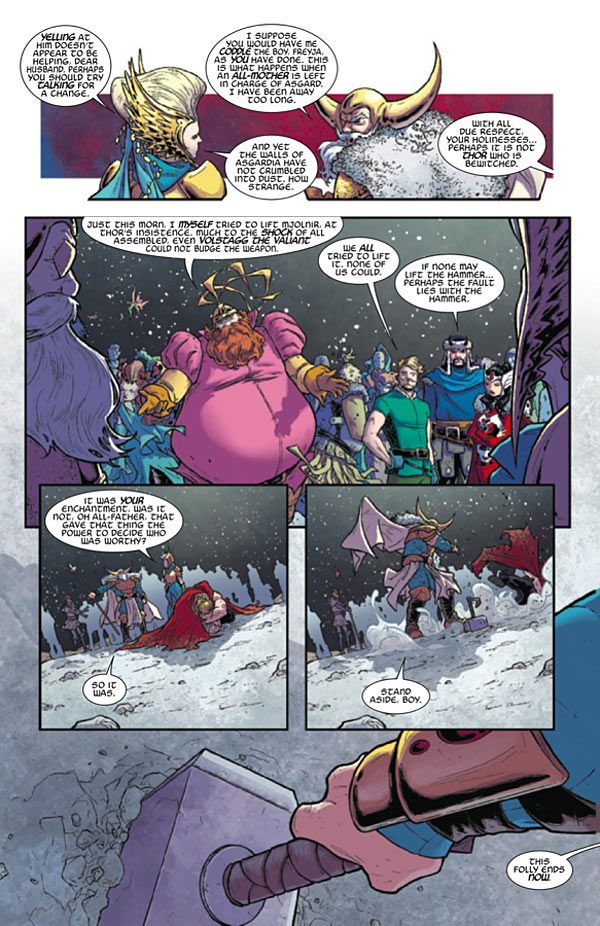There's a new "Thor" #1 on the stands right now -- perhaps you've heard of it? It sure seems like a lot of people are reading the debut of this comic by Jason Aaron, Russell Dauterman, Matt Wilson and Joe Sabino. I wonder how many people will keep flipping past the new Thor's grand entrance and read the letters page?
I highly recommend you do read the letters page, just in case you stopped with the introduction of Mjolnir's new master. That one page and its two letters pretty perfectly sums up the heated online debate that's been circling around this version of the god of thunder since her introduction back in July. One letter comes from a longtime reader who says that the Thor change is so egregious that he's "seriously considering leaving comics altogether." The letter calls the change a "gimmick regardless of spin." The other letter comes from a fan who views the new Thor as the exact thing they needed to lift themselves out of a depression, and the exact hero they have waited for their entire life. The writer admitted that they were crying while composing the letter, and I will now admit that I teared up while reading it.
Catch Up on CBR's Coverage of Marvel's All-New Thor!
I don't know how writer Jason Aaron finds the time to write so many comics and answer the letters featured on these pages, but he does it -- and he should get as much acclaim for how he handles these letters. I could spend a whole article writing my own response to the anti-"Thor" letter, but Aaron already did that well -- partly by citing just how prevalent transformation has been throughout the history of the character. After all, an alien has become Thor and Thor has become a frog in the past. How is Thor becoming a woman more far-fetched, gimmick-y, or offensive?
There is one fear-point made in the letter that I want to address, because it's the one fear we see pop up every single time a white guy gets replaced by a non-white guy in comics (and movies, and television, and...). There's always this fear that the original white guy is going away forever, that the arrival of this new character means the total "Back to the Future"-style erasure of the originator from all of existence. The letter in "Thor" #1 cites the "years of reading time and gobs of money on merchandise tied to this one character" the reader has invested on the Odinson as if the all-new hero actually sneaked into their house and broke their Thor mugs. I don't mean to pick on this one person, either, because this line of "reasoning" appears all over the Internet. I'm sure I could toss in a few tweets with similar "you wrecked my childhood" sentiments in here if I felt like wandering down the dark alleys of social media. The truth is, as shown in the pages of the comic that preceded this letters page, these men are never going away.
First, spoiler alert for "Thor" #1. Come on, read the comic! In this issue, the one setting haters' brains afire because it signals the end of the Thor they've come to adore, the female Thor appears on two of the twenty-two pages. He-Thor appears on 12 of those pages. Jason Aaron has said since the initial announcement that he was not yet done with Thor, and Thor's arc was still very much a concern for him. A certain group of fans raged anyway. Now we have this issue, and there it is -- the original Thor appears on six times as many pages as the presumed titular character.
RELATED: Aaron Details the Female Thor Debut, Simonson Talks Prior Changes
Given that the issue ends with the Odinson literally descending as a new hero ascends, I can only assume that this page ratio will flip for the second issue. But after that? I think this issue proves that Aaron's statements about having plans for classic Thor are true. There are so many threads in play here that pull directly from Aaron's previous series, "Thor: God of Thunder," that it would be shocking if he kept the Norse god buried deep in the Norweigan ocean.
There's a metaphor in here about feminism and the fear that a lot of men have about the concept. There's a misconception that feminism means women above men and that women are seeking to replace men in positions of power and -- I dunno -- I guess rocket them off the planet to their own Man Planet? The actual, literal, textbook definition of feminism is "the advocacy of women's rights on the grounds of political, social, and economic equality to men."
Key word there: equality.
When a female character picks up a mantle previously held by a male character, it's really hard not to conflate men's misguided fear of feminism with old school comic book fans' fear of change. The reaction to the new Thor feels about as rageful and head scratching as the reaction to Doctor Octopus taking over Peter Parker's body in "Superior Spider-Man." Both changes led fans to flip out as if Marvel had set their extensive back issue collections on fire, and those fans felt "betrayed" because they were no longer getting a monthly dose of the hero they had invested "years of reading time" and "gobs of money on merchandise."
There's a real noticeable difference when the hero's replacement is a woman. I think that's because it takes the already strong resistance to change that a lot of predominantly male comic book fans have and multiplies it by "misandry" to the power of "feminazi." There's a whole misogynist vocabulary that comes into play when the new hero is a woman. Our real world society has yet to create as cutting of slurs for evil scientists like Doc Ock as it has for women like the new Thor. I would be surprised if the same men that are uncomfortable with the idea of a female Thor are not also uncomfortable with the idea of having a woman for a boss. The fear that a female Thor is going to replace the male one seems to run parallel to the fear that feminism means women destroying men.
But remember that word in feminism's definition, "equality?" Just going by Aaron's interviews and the evidence in "Thor" #1, I think the writer plans on subtly using the new series to present a version of feminism that brings its hammer down hard on the "E" word. We see it in the interaction between the All-Mother and the returning All-Father. Odin questions Freyja's abilities as a competent leader, and she fires back with, "and yet the walls of Asgardia have not crumbled into dust." The writer has portrayed Freyja as an equally capable leader to Odin -- quite a feat considering just how omnipresent Odin is in Thor's back issues compared to his incredibly underused mother. Aaron seems to be writing Freyja as Odin's total equal.
And then there's the case of our two Thors. The advice that women often give to men interested in feminism is to take the space they inhabit -- be it their profession, hobby, social circle, viewpoints -- and make it feminist. As a man in the male-dominated comic book industry, Jason Aaron had a head start. That's not to discount his talent, not at all; at this point I would be hard-pressed to come up with a writer I enjoy as consistently and thoroughly as Aaron. The man's talent got him to the position he now enjoys, where he gets tapped to write "Star Wars," but I can guarantee that he did not have as hard of a time getting started as any of his female peers have. He's probably never had to sit on a "Men In Comics" panel, and I highly doubt he's never been accused of only getting gigs because of sexual favors. Has he ever had rape threats hurled at him simply because he didn't like something or called something out as being problematic? Aaron can now get away with writing anything he pleases; he's that great of a writer. He has chosen to turn his space -- the space inhabited by one of the biggest writers working in comics -- into a feminist space, literally.
I do mean literally. Aaron has turned the incredibly male-heavy "Thor: God of Thunder" into "Thor," a book that will soon give us a female Thor that will presumably get an equal amount of attention to that of the fallen god of thunder. And you know what, he and Jason Latour have also done the same thing in "Southern Bastards," which featured a totally surprising finale to its first arc that bodes well where diversity is concerned. Jason Aaron was not content to just launch a new female-led book, thus subjecting it to the whims of a marketplace that has -- in the past -- been hesitant towards those comics. He took the big, A-List, prominent book he was working on to great acclaim and pretty unanimous fan praise, and made it the dictionary definition of feminist. That's fantastic.
Equality is what's important. Women are not an invading army here to steal male territory and conquer men -- although I would be totally fine with reading a comic book based on that. Half of the population identifies as female; they're people. We've had over 600 issues of a male Thor, and I'm excited to get my first issue starring a female one.
Brett White is a comedian living in New York City. He co-hosts Matt & Brett Love Comics, writes for the sketch comedy podcast Left Handed Radio, and makes videos for the Upright Citizens Brigade as a member of UCB1. His opinions can be consumed in bite-sized morsels on Twitter (@brettwhite).



